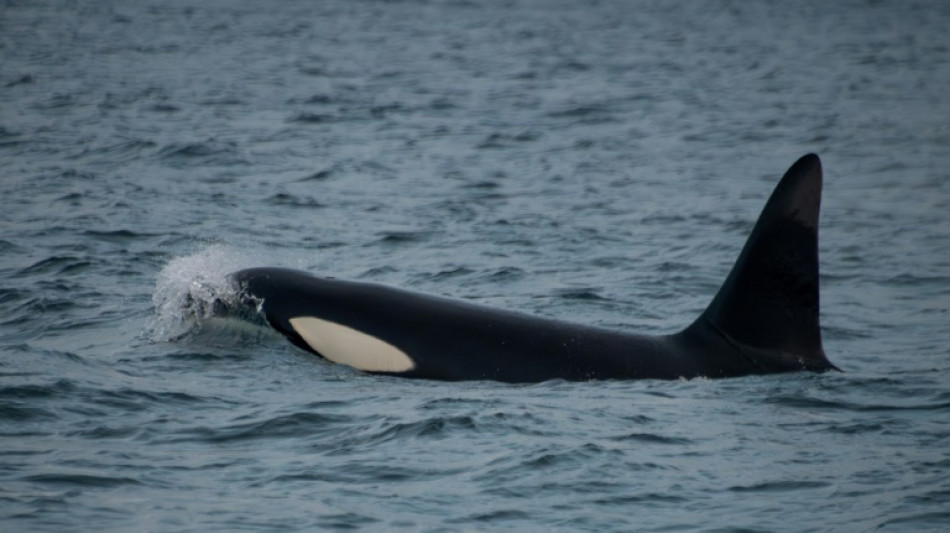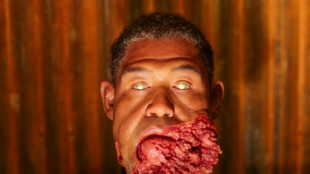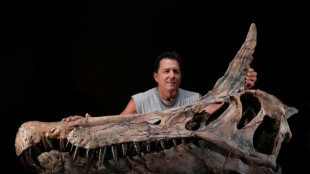
-
 In Iran attack, Trump seeks what he foreswore -- regime change
In Iran attack, Trump seeks what he foreswore -- regime change
-
Climate change forces facelift for Michelangelo masterpiece

-
 Trump says US aims to destroy Iran's military, topple government
Trump says US aims to destroy Iran's military, topple government
-
Acosta wins season-opening MotoGP sprint after Marquez penalty

-
 US and Israel launch strikes against Iran
US and Israel launch strikes against Iran
-
Afghanistan says Pakistan fighter jet down as cross-border strikes flare

-
 Kerr says only '85 percent' fit for Women's Asian Cup
Kerr says only '85 percent' fit for Women's Asian Cup
-
Messi's Inter Miami to visit White House: US media

-
 Thunder beat Nuggets in overtime on Gilgeous-Alexander's return
Thunder beat Nuggets in overtime on Gilgeous-Alexander's return
-
'It's surreal': Zimbabwe superfans revel in unexpected ride to India

-
 New 'Wuthering Heights' film unleashes fresh wave of Bronte-mania
New 'Wuthering Heights' film unleashes fresh wave of Bronte-mania
-
US backs Pakistan's 'right to defend itself' after strikes on Afghanistan

-
 Bezzecchi beats Marquez to pole at season-opening Thailand MotoGP
Bezzecchi beats Marquez to pole at season-opening Thailand MotoGP
-
OpenAI strikes Pentagon deal with 'safeguards' as Trump dumps Anthropic

-
 Oscar-nominated 'F1' sound engineers recreate roar of racetrack
Oscar-nominated 'F1' sound engineers recreate roar of racetrack
-
15 dead as cash-packed military plane crashes in Bolivia

-
 Costa Rica's Grynspan pledges reform in bid for UN chief job
Costa Rica's Grynspan pledges reform in bid for UN chief job
-
Former All Black Bridge hailed for influence at Western Force

-
 'Sinners' vampires inspired by animals, says Oscar hopeful makeup artist
'Sinners' vampires inspired by animals, says Oscar hopeful makeup artist
-
For Oscar nominee Stellan Skarsgard, good cinema is like slow food

-
 'Brilliant industry' sees Reds down Highlanders in Super Rugby
'Brilliant industry' sees Reds down Highlanders in Super Rugby
-
Neil Sedaka, US singer and songwriter, dies age 86

-
 Paramount acquires Warner Bros. in $110 bn mega-merger
Paramount acquires Warner Bros. in $110 bn mega-merger
-
Rosenior eyes extended stay to stabilise Chelsea

-
 Spurs struggling physically admits Tudor
Spurs struggling physically admits Tudor
-
Lens held by Strasbourg in blow to Ligue 1 title chances

-
 NFL salary cap passes $300 mn for first time
NFL salary cap passes $300 mn for first time
-
Wolves secure rare win to dent Villa's bid for Champions League place

-
 Oil prices jump on Iran attack fears while US stocks fall
Oil prices jump on Iran attack fears while US stocks fall
-
Two dead, dozens injured as tram derails in Milan

-
 Trump tells US govt to 'immediately' stop using Anthropic AI tech
Trump tells US govt to 'immediately' stop using Anthropic AI tech
-
Court orders Greenpeace to pay $345 mn to US oil pipeline company

-
 IAEA stresses 'urgency' to verify Iran's nuclear material
IAEA stresses 'urgency' to verify Iran's nuclear material
-
UN urges action to prevent full civil war in South Sudan

-
 Hackers steal medical details of 15 million in France
Hackers steal medical details of 15 million in France
-
Susan Sarandon praises Spain’s stance on Gaza

-
 Murray adamant size isn't everything despite losing Wales place
Murray adamant size isn't everything despite losing Wales place
-
Messi knocked down by fan in Puerto Rico pitch invasion

-
 Two killed, dozens injured as tram derails in Milan
Two killed, dozens injured as tram derails in Milan
-
O'Neill taken aback by Rangers boss Rohl's comments on Celtic

-
 Ukrainian, Slovak leaders hold call amid energy spat
Ukrainian, Slovak leaders hold call amid energy spat
-
French hard-left firebrand sparks row with 'antisemitic' Epstein jibe

-
 Ahmed, Jacks blast England to thrilling win over New Zealand
Ahmed, Jacks blast England to thrilling win over New Zealand
-
UK police arrest man after Churchill statue sprayed with graffiti

-
 Bill Clinton denies wrongdoing at grilling on Epstein ties
Bill Clinton denies wrongdoing at grilling on Epstein ties
-
Red Cross urges Afghanistan-Pakistan 'de-escalation'

-
 Coup role revelations revive calls for return of Spain's ex king
Coup role revelations revive calls for return of Spain's ex king
-
Oil prices jump on Iran attack fears, Wall Street slips on AI

-
 TikTok disinformation: the other weapon in Mexico violence
TikTok disinformation: the other weapon in Mexico violence
-
Carmaker BMW to trial humanoid robots at German factory


Killer whales spotted grooming each other with seaweed
Killer whales have been caught on video breaking off pieces of seaweed to rub and groom each other, scientists announced Monday, in what they said is the first evidence of marine mammals making their own tools.
Humans are far from being the only member of the animal kingdom that has mastered using tools. Chimpanzees fashion sticks to fish for termites, crows create hooked twigs to catch grubs and elephants swat flies with branches.
Tool-use in the world's difficult-to-study oceans is rarer, however sea otters are known to smash open shellfish with rocks, while octopuses can make mobile homes out of coconut shells.
A study published in the journal Current Biology describes a new example of tool use by a critically endangered population of orcas.
Scientists have been monitoring the southern resident killer whales in the Salish Sea, between Canada's British Columbia and the US state of Washington, for more than 50 years.
Rachel John, a Masters student at Exeter University in the UK, told a press conference that she first noticed "something kind of weird" going on while watching drone camera footage last year.
The researchers went back over old footage and were surprised to find this behaviour is quite common, documenting 30 examples over eight days.
One whale would use its teeth to break off a piece of bull kelp, which is strong but flexible like a garden hose.
It would then put the kelp between its body and the body of another whale, and they would rub it between them for several minutes.
The pair forms an "S" shape to keep the seaweed positioned between their bodies as they roll around.
- For fun and clean skin -
Whales are already known to frolic through seaweed in a practice called "kelping".
They are thought to do this partly for fun, partly to use the seaweed to scrub their bodies to remove dead skin.
The international team of researchers called the new behaviour "allokelping," which means kelping with another whale.
They found that killer whales with more dead skin were more likely to engage in the activity, cautioning that it was a small sample size.
Whales also tended to pair up with family members or others of a similar age, suggesting the activity has a social element.
The scientists said it was the first known example of a marine mammal manufacturing a tool.
Janet Mann, a biologist at Georgetown University not involved in the study, praised the research but said it "went a bit too far" in some of its claims.
Bottlenose dolphins that use marine sponges to trawl for prey could also be considered to be manufacturing tools, she told AFP.
And it could be argued that other whales known to use nets of bubbles or plumes of mud to hunt represent tool-use benefitting multiple individuals, another first claimed in the paper, Mann said.
- Culture could soon be lost -
Michael Weiss, research director at the Center for Whale Research and the study's lead author, said it appeared to be just the latest example of socially learned behaviour among animals that could be considered "culture".
But the number of southern resident killer whales has dwindled to just 73, meaning we could soon lose this unique cultural tradition, he warned.
"If they disappear, we're never getting any of that back," he said.
The whales mainly eat Chinook salmon, whose numbers have plummeted due to overfishing, climate change, habitat destruction and other forms of human interference.
The orcas and salmon are not alone -- undersea kelp forests have also been devastated as ocean temperatures rise.
Unless something changes, the outlook for southern resident killer whales is "very bleak," Weiss warned.
Ch.Havering--AMWN


